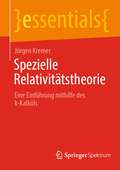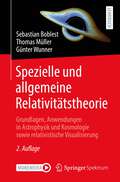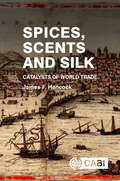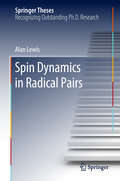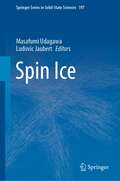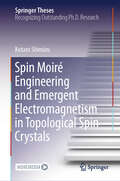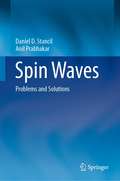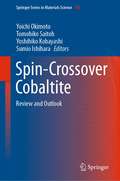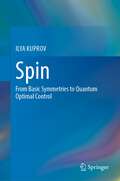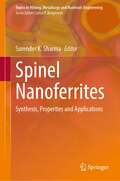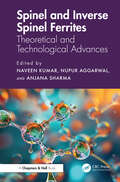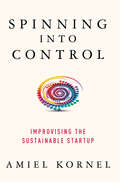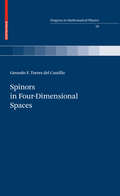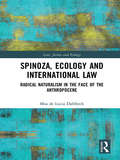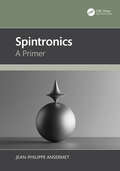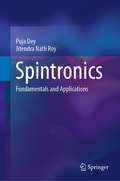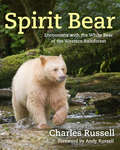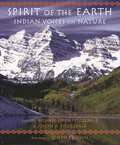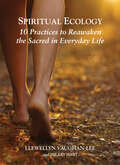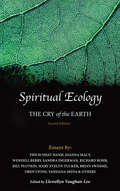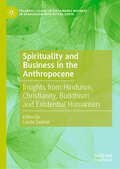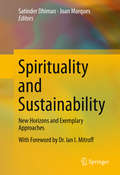- Table View
- List View
Spezielle Relativitätstheorie: Eine Einführung mithilfe des k-Kalküls (essentials)
by Jürgen KremerDas Buch bietet eine Einführung in die Spezielle Relativitätstheorie mithilfe des k- Kalküls. Dieser Zugang ist sehr elegant und verwendet die auf der Radarmethode basierende geometrische Darstellung der zweidimensionalen Raumzeit aus der Perspektive inertialer Beobachter. Die letzten Kapitel des Buchs behandeln die vierdimensionalen Lorentz-Transformationen und die Äquivalenz von Masse und Energie. Das Buch endet mit einer Darstellung des Zusammenhangs zwischen der Signalübertragung mit Überlichtgeschwindigkeit und der Verletzung des Kausalitätsprinzips.
Spezielle und allgemeine Relativitätstheorie für Bachelorstudenten
by Reinhard MeinelDieses Lehrbuch bietet bereits im Bachelorstudium einen gut verständlichen Zugang nicht nur zur speziellen, sondern auch zur allgemeinen Relativitätstheorie. Besonderheiten: Erstmals in einem Lehrbuch wird eine physikalische Herleitung der berühmten Kerr-Newman-Lösung gegeben. Dank der zahlreichen Übungsaufgaben mit ausführlich dargestellten Lösungen ist das Buch auch zum Selbststudium geeignet. Inhalt: Einführung – Der Minkowski-Raum, die Raumzeit der SRT – Lorentz-Transformationen – Vierervektoren und Vierertensoren – Relativistische Punktmechanik – Andere Teilgebiete der Physik im Rahmen der SRT – Grundideen der ART – Geometrie der Raumzeit – Physik in der gekrümmten Raumzeit – Die Einstein'schen Feldgleichungen – Der Newton'sche Grenzfall – Die Schwarzschild-Lösung – Die klassischen Effekte der ART – Kugelsymmetrische Sternmodelle – Die Schwarzschild-Lösung als Schwarzes Loch – Das Wirkungsprinzip der ART – Ausblick auf Gravitationswellen, Kosmologie und Quantengravitation – Mathematische Methoden – Rotierende und elektrisch geladene Schwarze Löcher – Die rotierende Staubscheibe Neuerungen (3. Aufl.): Neben neuen Aufgaben und Lösungen wurde auch ein Abschnitt zur Thermodynamik Schwarzer Löcher hinzugefügt. Zielgruppe: Studierende und Lehrende der Physik, sowohl im Hauptstudium als auch im Lehramtsstudium Vorkenntnisse: Vorausgesetzt werden lediglich Grundkenntnisse der klassischen Mechanik und der Elektrodynamik sowie der zugehörigen mathematischen Hilfsmittel.
Spezielle und allgemeine Relativitätstheorie: Grundlagen, Anwendungen in Astrophysik und Kosmologie sowie relativistische Visualisierung
by Thomas Müller Sebastian Boblest Günter WunnerDieses Lehrbuch verknüpft die mathematischen Grundlagen der speziellen und allgemeinen Relativitätstheorie mit zahlreichen Anwendungsgebieten aus Physik und Astronomie. Neben der Diskussion von klassischen Experimenten, welche die Vorhersagen der Relativitätstheorie bestätigen, wird ein Fokus auf die Kosmologie als Anwendung der Relativitätstheorie gesetzt. Die Behandlung der Physik kompakter stellarer Objekte, d. h. von weißen Zwergen, Neutronensternen und Schwarzen Löchern, mit einem kurzen Abschnitt zur Entstehung und Entwicklung von Sternen runden die Darstellung ab.Einen besonderen Schwerpunkt legen die Autoren auf die relativistische Visualisierung. In zwei Kapiteln bekommt der Leser einen Überblick über verschiedene Techniken in der speziellen und allgemeinen Relativitätstheorie. Anhand von Beispielen können die der Alltagserfahrung scheinbar widersprechenden Vorhersagen der Relativitätstheorie besser fassbar gemacht werden. Die daraus gewonnenen Abbildungen und begleitenden Videos, die über die SN More Media App zugänglich sind, erweitern das Verständnis der im Text behandelten Themen.In der vorliegenden zweiten Auflage haben die Autoren vor allem neuere Entwicklungen (z.B. zum Thema Gravitationswellen) aufgenommen und zudem viele kleinere Verbesserungen und Ergänzungen vorgenommen. Das Buch richtet sich besonders an Studierende der Physik und verwandter Studiengänge, die sich einen Überblick über die Relativitätstheorie und ihre Anwendungsgebiete verschaffen möchten, aber auch interessierte Laien können damit interessante Einsichten gewinnen.
Spices, Scents and Silk: Catalysts of World Trade
by James HancockSpices, scents and silks were at the centre of world trade for millennia. Exotic luxuries such as cinnamon, ginger, pepper, saffron, clove, frankincense and myrrh. Through their international trade, humans were pushed to explore and then travel to the far corners of the earth. Almost from their inception, the earliest great civilizations - Egypt, Sumer and Harappa - became addicted to the luxury products of far-off lands and established long-reaching trade networks. Over time, great powers fought mightily for the kingdoms where silk, spices and scents were produced. The New World was accidentally discovered by Columbus in his quest for spices. What made trade in these products so remarkable was that the plants producing them grew in very restricted areas of the world, distant from the wealthy civilizations of northern Africa, Greece and Europe. These luxuries could be carried from mysterious locations on the backs of camels or in the holds of ships for months on end, and arrived at their final destination in nearly perfect condition. Once the western world discovered the intoxicating properties of these products, their procurement became a dominant force in the world economy. Nothing else compared with their possible profit returns. In this book, eminent horticulturist and author James Hancock examines the origins and early domestication and culture of spices, scents and silks and the central role they played in the lives of the ancients. The book also traces the development of the great international trade networks and explores how struggles for trade dominance and demand for such luxuries shaped the world. Recommended for academics, students and general readers with an interest in crop and agricultural development, world trade, economic botany, history of food, and global economics and public policy, Spices, Scents and Silk offers a fascinating and insightful history.
Spin Dynamics and Damping in Ferromagnetic Thin Films and Nanostructures
by Anjan Barman Jaivardhan SinhaThis book provides a comprehensive overview of the latest developments in the field of spin dynamics and magnetic damping. It discusses the various ways to tune damping, specifically, dynamic and static control in a ferromagnetic layer/heavy metal layer. In addition, it addresses all optical detection techniques for the investigation of modulation of damping, for example, the time-resolved magneto-optical Kerr effect technique.
Spin Dynamics in Radical Pairs (Springer Theses)
by Alan LewisThis book sheds new light on the dynamical behaviour of electron spins in molecules containing two unpaired electrons (i.e. a radical pair). The quantum dynamics of these spins are made complicated by the interaction between the electrons and the many nuclear spins of the molecule; they are intractable using analytical techniques, and a naïve numerical diagonalization is not remotely possible using current computational resources. Hence, this book presents a new method for obtaining the exact quantum-mechanical dynamics of radical pairs with a modest number of nuclear spins. Readers will learn how a calculation that would take 13 years using conventional wavepacket propagation can now be done in 1 day, and will also discover a new semiclassical method for approximating the dynamics in the presence of many nuclear spins. The new methods covered in this book are shown to provide significant insights into three topical and diverse areas: charge recombination in molecular wires (which can be used in artificially mimicking photosynthesis), magnetoelectroluminescence in organic light-emitting diodes, and avian magnetoreception (how birds sense the Earth’s magnetic field in order to navigate).
Spin Dynamics in Two-Dimensional Quantum Materials: A Theoretical Study (Springer Theses)
by Marc Vila TusellThis thesis focuses on the exploration of nontrivial spin dynamics in graphene-based devices and topological materials, using realistic theoretical models and state-of-the-art quantum transport methodologies. The main outcomes of this work are: (i) the analysis of the crossover from diffusive to ballistic spin transport regimes in ultraclean graphene nonlocal devices, and (ii) investigation of spin transport and spin dynamics phenomena (such as the (quantum) spin Hall effect) in novel topological materials, such as monolayer Weyl semimetals WeTe2 and MoTe2. Indeed, the ballistic spin transport results are key for further interpretation of ultraclean spintronic devices, and will enable extracting precise values of spin diffusion lengths in diffusive transport and guide experiments in the (quasi)ballistic regime. Furthermore, the thesis provides an in-depth theoretical interpretation of puzzling huge measured efficiencies of the spin Hall effect in MoTe2, as well as a prediction of a novel canted quantum spin Hall effect in WTe2 with spins pointing in the yz plane.
Spin Ice (Springer Series in Solid-State Sciences #197)
by Masafumi Udagawa Ludovic JaubertThis book deals with a new class of magnetic materials, spin ice. Spin ice has become the canonical example of modern frustrated magnetism where competing interactions between spins set the rules for an emergent magnetostatic gauge field theory. Excitations take the form of magnetic monopoles or can condense via a Higgs mechanism. Beyond classical spin ice, the book describes the new physics emerging when quantum coherence (spin liquids, photon-like excitations) and itinerant electrons (anomalous Hall effect) are included in artificial systems. This first book dedicated to spin ice is a review of the current understanding of the field, both on the theoretical and experimental levels, written by leading experts. The book is written in a linear way with very few prerequisites. It also contains textbook-like descriptions of theoretical methods to help advanced students and researchers to enter the field.
Spin Moiré Engineering and Emergent Electromagnetism in Topological Spin Crystals (Springer Theses)
by Kotaro ShimizuThis book provides a comprehensive theoretical investigation into the engineering of topological properties, emergent electromagnetic phenomena, and magnetic and electrical functionalities of materials associated with topological spin textures. Topological spin textures in bulk magnets such as skyrmions form their periodic arrangements called topological spin crystals. They exhibit unique magnetic properties and quantum transport phenomena due to their noncollinear and noncoplanar spin textures. One of the challenging problems in these magnets is flexible generation, annihilation, and control of the spin textures with different topology, leading to their novel functionality useful for next-generation devices. Although such a problem has been discussed in several specific cases, a generic viewpoint was missing in the previous works. To facilitate the systematic discussion on the control of the topological spin textures, the author proposes the &“spin moiré&” picture, taking particular note of the observation that topological spin crystals are often represented as superpositions of multiple spin density waves. Moiré is an interference fringe generated by a superposition of waves and it exhibits the periodicity different from the superposed waves. Importantly, a variety of moiré patterns are realized in many ways by changing a number of parameters, e.g., periods, amplitudes, phases, propagating directions, and the number of superposed waves. Given the analogy with the conventional moiré patterns, one can conceive a further variety of spin patterns and their continuous modulations by regarding the topological spin crystals as moiré patterns of the vector (spinor) fields. Given the growing recognition of topology's significance in describing the state of matter, especially in magnetic materials, the findings presented in this book establish a versatile framework for controlling topological magnetism, which does not only advance the fundamental understanding of topological properties in magnets but also opens new pathways for exploring emergent electromagnetic phenomena and designing magnetic functionalities. Intended for students and researchers in the fields of condensed matter physics and material science, this book serves as a valuable resource for those interested in fundamental theory and advanced discussions of topological magnetism and its control.
Spin Waves: Problems and Solutions
by Daniel D. Stancil Anil PrabhakarThis book presents a collection of problems in spin wave excitations with their detailed solutions. Each chapter briefly introduces the important concepts, encouraging the reader to further explore the physics of spin wave excitations and the engineering of spin wave devices by working through the accompanying problem sets. The initial chapters cover the fundamental aspects of magnetization, with its origins in quantum mechanics, followed by chapters on spin wave excitations, such as the magnetostatic approximation, Walker's equation, the spin wave manifold in the three different excitation geometries of forward volume, backward volume and surface waves, and the dispersion of spin waves. The latter chapters focus on the practical aspects of spin waves and spin wave optical devices and use the problem sets to introduce concepts such as variational analysis and coupled mode theory. Finally, for the more advanced reader, the book covers nonlinear interactions and topics such as spin wave quantization, spin torque excitations, and the inverse Doppler effect. The topics range in difficulty from elementary to advanced. All problems are solved in detail and the reader is encouraged to develop an understanding of spin wave excitations and spin wave devices while also strengthening their mathematical, analytical, and numerical programming skills.
Spin-Crossover Cobaltite: Review and Outlook (Springer Series in Materials Science #305)
by Sumio Ishihara Yoichi Okimoto Tomohiko Saitoh Yoshihiko KobayashiThis book describes the history of and recent developments in cobaltite and the spin-crossover (SC) phenomena. It offers readers an overview of essential research conducted on cobaltite and introduces them to the fundamentals of condensed matter physics research.The book consists of two parts. The first part reviews SC phenomena, covering the fundamental physics of SC phenomena and basic material properties of cobaltite. The second part focuses on recent topics in SC cobaltite, including the optical and dynamical features of cobaltite, thin material fabrication, and thermoelectric properties. The comprehensive coverage and clearly structured topics will especially appeal to newcomers to the field of state-of-the-art research on cobaltite and SC physics.
Spin: From Basic Symmetries to Quantum Optimal Control
by ILYA KUPROVThis monograph is a fundamental reference for scientists and engineers who encounter spin processes in their work. The author, Ilya Kuprov, derives the concept of spin from basic symmetries and gives an overview of theoretical and computational aspects of spin dynamics: from Dirac equation and spin Hamiltonian, through coherent evolution and relaxation theories, to quantum optimal control, and all the way to practical implementation advice for parallel computers.
Spinel Nanoferrites: Synthesis, Properties and Applications (Topics in Mining, Metallurgy and Materials Engineering)
by Surender K. SharmaThis book highlights the complexity of spinel nanoferrites, their synthesis, physio-chemical properties and prospective applications in the area of advanced electronics, microwave devices, biotechnology as well as biomedical sciences. It presents an overview of spinel nanoferrites: synthesis, properties and applications for a wide audience: from beginners and graduate-level students up to advanced specialists in both academic and industrial sectors. There are 15 chapters organized into four main sections. The first section of the book introduces the readers to spinel ferrites and their applications in advanced electronics industry including microwave devices, whereas the second section mainly focus on the synthesis strategy and their physio-chemical properties. The last sections of the book highlight the importance of this class of nanomaterials in the field of biotechnology and biomedical sector with a special chapter on water purification.
Spinel and Inverse Spinel Ferrites: Theoretical and Technological Advances
by Naveen Kumar, Nupur Aggarwal, and Anjana SharmaThis comprehensive book explores spinel and inverse spinel ferrites, focusing on their synthesis methods, structural characteristics, magnetic properties, and diverse applications. It offers a valuable resource for understanding how these materials are transforming fields such as electronics, energy conversion, sensing, biomedicine, agriculture, and environmental management. The book provides practical insights into synthesis methods, fabrication techniques, and the scale-up processes required to move these materials toward commercial applications. With a focus on recent advancements such as nanoscale engineering and surface modifications, the book offers readers insights into the commercial and practical potential of these materials across various industries. Delivers practical guidance on the synthesis, fabrication, and scale-up of these materials, addressing their commercialization prospects. Examines the role of spinel and inverse spinel ferrites in magnetic resonance imaging (MRI), exploring their applications in medical diagnostics and treatment. Discusses their effectiveness in electromagnetic interference (EMI) shielding, emphasizing the importance of ferrites in electronic and telecommunication devices. Provides insights into the application of ferrites as sensors, with a focus on their use in gas sensing, biosensing, and other diagnostic tools. Highlights photocatalytic activity and environmental remediation, showcasing how these materials help in pollution control, water purification, and sustainable energy solutions. This reference book is for students, researchers, and professionals in physics, materials science, and engineering who wish to deepen their understanding of spinel and inverse spinel ferrites and their interdisciplinary applications.
Spinning into Control: Improvising the Sustainable Startup
by Amiel KornelThis book encourages startup founders to maintain control of their destiny by obsessively perfecting their startup's story and key relationships as much as its initial product or service. It highlights the importance of improvisation in the incubation of startups. Startup founders hoping to master their destinies develop the skills of venture craftsmen, learning to behave more like explorers and artisans than managers and engineers. The improvisational arts of tinkering, wandering, and conversing overcome the limitations of scientifically based "lean" methodologies for creating startups. These skills provide wobbly, nascent ventures with stability and conserve momentum during early-stage incubation. Like the gimbals of a gyroscope, they counter the entropy born of change, conflict and confusion that is continuously pushing young enterprises towards chaos. As their startups spin, venture craftsmen actually loosen the coupling between command and control. Startup sustainability relies on relentless improvisation, the heart of the art of entrepreneurship. Vignettes in each chapter of Spinning Into Control relate hardscrabble stories of entrepreneurs, craftsmen and venturers -- some recently interviewed by the author, others historical -- recounting the challenges they faced, their responses, the lessons they learned, and the eventually triumphant outcomes.
Spinors in Four-Dimensional Spaces
by Gerardo F. Torres del CastilloWithout using the customary Clifford algebras frequently studied in connection with the representations of orthogonal groups, this book gives an elementary introduction to the two-component spinor formalism for four-dimensional spaces with any signature. Some of the useful applications of four-dimensional spinors, such as Yang-Mills theory, are derived in detail using illustrative examples. Spinors in Four-Dimensional Spaces is aimed at graduate students and researchers in mathematical and theoretical physics interested in the applications of the two-component spinor formalism in any four-dimensional vector space or Riemannian manifold with a definite or indefinite metric tensor. This systematic and self-contained book is suitable as a seminar text, a reference book, and a self-study guide.
Spinoza, Ecology and International Law: Radical Naturalism in the Face of the Anthropocene (Law, Justice and Ecology)
by Moa De Lucia DahlbeckThis book addresses the use of Benedict Spinoza’s philosophy in current attempts to elaborate an ecological basis for international environmental law. Because the question of environmental protection has not been satisfactory resolved, the legal debate concerning our responsibility for the environment has – as evidenced in the recent UN report series Harmony with Nature – come to invite calls for a new eco-centric, rather than anthropocentric, legal paradigm. In this respect, Spinoza appears as a key figure. He is one of the few philosophers in the history of western philosophy who cares, and writes extensively, about the roots of anthropocentrism; the core issue of contemporary normative debates in ecology. And in response to the rapidly developing ecological crisis, his work has become central to a re-thinking of the human relationship with nature. Addressing the contention that Spinoza’s ethics might provide a useful source for developing a new, eco-centred framework for environmental law, this book elaborates a more nuanced understanding of Spinoza’s philosophy. Spinoza cannot, it is argued here, simply be reduced to an eco-ethicist. That is: his metaphysics cannot be used as basis of an essentially naturalised or extended human morality. At the same time, however, this book argues that the radicality of Spinoza’s naturalism nevertheless offers the possibility of developing a more adequate ecological basis for environmental law.
Spintronics: A Primer
by Jean-Philippe AnsermetA sound understanding of magnetism, transport theory, spin relaxation mechanisms, and magnetization dynamics is necessary to engage in spintronics research. In this primer, special effort has been made to give straightforward explanations for these advanced concepts.This book will be a valuable resource for graduate students in spintronics and related fields. Concepts of magnetism such as exchange interaction, spin-orbit coupling, spin canting, and magnetic anisotropy are introduced. Spin-dependent transport is described using both thermodynamics and Boltzmann’s equation, including Berry curvature corrections. Spin relaxation phenomenology is accounted for with master equations for quantum spin systems coupled to a bath. Magnetic resonance principles are applied to describe spin waves in ferromagnets, cavity-mode coupling in antiferromagnets, and coherence phenomena relevant to spin qubits applications.Key Features:• A pedagogical approach to foundational concepts in spintronics with simple models that can be calculated to enhance understanding.• Nineteen chapters, each beginning with a historical perspective and ending with an outlook on current research.• 1200 references, ranging from landmark papers to frontline publications.
Spintronics: Fundamentals and Applications
by Puja Dey Jitendra Nath RoyThis book highlights the overview of Spintronics, including What is Spintronics ?; Why Do We Need Spintronics ?; Comparative merit-demerit of Spintronics and Electronics ; Research Efforts put on Spintronics ; Quantum Mechanics of Spin; Dynamics of magnetic moments : Landau-Lifshitz-Gilbert Equation; Spin-Dependent Band Gap in Ferromagnetic Materials; Functionality of ‘Spin’ in Spintronics; Different Branches of Spintronics etc. Some important notions on basic elements of Spintronics are discussed here, such as – Spin Polarization, Spin Filter Effect, Spin Generation and Injection, Spin Accumulation, Different kinds of Spin Relaxation Phenomena, Spin Valve, Spin Extraction, Spin Hall Effect, Spin Seebeck Effect, Spin Current Measurement Mechanism, Magnetoresistance and its different kinds etc. Concept of Giant Magnetoresistance (GMR), different types of GMR, qualitative and quantitative explanation of GMR employing Resistor Network Theory are presented here. Tunnelling Magnetoresistance (TMR), Magnetic Junctions, Effect of various parameters on TMR, Measurement of spin relaxation length and time in the spacer layer are covered here. This book highlights the concept of Spin Transfer Torque (STT), STT in Ferromagnetic Layer Structures, STT driven Magnetization Dynamics, STT in Magnetic Multilayer Nanopillar etc. This book also sheds light on Magnetic Domain Wall (MDW) Motion, Ratchet Effect in MDW motion, MDW motion velocity measurements, Current-driven MDW motion, etc. The book deals with the emerging field of spintronics, i.e., Opto-spintronics. Special emphasis is given on ultrafast optical controlling of magnetic states of antiferromagnet, Spin-photon interaction, Faraday Effect, Inverse Faraday Effect and outline of different all-optical spintronic switching. One more promising branch i.e., Terahertz Spintronics is also covered. Principle of operation of spintronic terahertz emitter, choice of materials, terahertz writing of an antiferromagnetic magnetic memory device is discussed. Brief introduction of Semiconductor spintronics is presented that includes dilute magnetic semiconductor, feromagnetic semiconductor, spin polarized semiconductor devices, three terminal spintronic devices, Spin transistor, Spin-LED, and Spin-Laser. This book also emphasizes on several modern spintronics devices that includes GMR Read Head of Modern Hard Disk Drive, MRAM, Position Sensor, Biosensor, Magnetic Field sensor, Three Terminal Magnetic Memory Devices, Spin FET, Race Track Memory and Quantum Computing.
Spirit Bear: Encounters with the White Bear of the Western Rainforest
by Charles RussellA classic work of nature and wildlife, Spirit Bear is the captivating story of wilderness guide and naturalist Charles Russell’s quest to understand the rare spirit bear of British Columbia’s Princess Royal Island — now updated and reissued with a new design and an afterword by the author.From early experiences observing black bears in the Rocky Mountains with his father, the well-known writer and broadcaster Andy Russell, to nerve-racking encounters with grizzlies in British Columbia’s Khutzeymateen Valley, Charles Russell has spent a lifetime studying bears in their natural habitat. In 1991, Russell visited Princess Royal Island, an uninhabited island off the coast of British Columbia. There, amidst the rivers and trees of the western rainforest, he encountered the elusive spirit bear.Known to scientists as the Kermode bear and to the public as the white, ghost, or spirit bear, these extraordinary animals have never been exposed to civilization. In Spirit Bear, Russell recounts his experiences on Princess Royal Island — trekking over rocks and through streams; waiting hours for the evasive ghost bear to appear; and finally coming face-to-face with a spirit bear only inches from his nose. Illustrated with more than 100 stunning colour photographs, Spirit Bear provides beautiful and astonishing insight into the habits and nature of the Kermode bear, and is part of an ongoing effort by conservationists to save Princess Royal Island as a sanctuary for these remarkable animals.
Spirit of the Earth: Indian Voices on Nature
Often spoken at the end of a prayer, a well-known Sioux phrase affirms that &“we are all related.&” Similarly, the Sioux medicine man, Brave Buffalo, came to realize when he was still a boy that &“the maker of all was Wakan Tanka (the Great Spirit), and . . . in order to honor him I must honor his works in nature.&” The interconnectedness of all things, and the respect all things are due, are among the most prominent—and most welcome—themes in this collection of Indian voices on nature.Within the book are carefully authenticated quotations from men and women of nearly fifty North American tribes. The illustrations include historical photographs of American Indians, as well as a wide selection of contemporary photographs showing the diversity of the North American natural world. Together, these quotations and photographs beautifully present something of nature&’s timeless message.
Spiritual Ecology: 10 Practices to Reawaken the Sacred in Everyday Life
by Llewellyn Vaughan-Lee Hilary HartSpiritual Ecology: 10 Practices to Reawaken the Sacred in Everyday Life offers inspiring and practical guidance for reconnecting to the sacred in every day life and transforming our relationship with the Earth. Describing the power of simple, daily practices such as Walking, Gardening, Cooking with Love, and Prayer, this small book supports profound changes in how we think about and respond to the ecological crisis of our times.Spiritual Ecology: 10 Practices to Reawaken the Sacred in Everyday Life follows our groundbreaking Spiritual Ecology: The Cry of the Earth, now in its second edition, which included spiritual perspectives on climate change, species loss, deforestation, and other aspects of our present environmental crises from renowned spiritual teachers, scientists, and indigenous leaders. That book drew an overwhelmingly positive reaction from readers, many of whom are asking: "What can I do?"Spiritual Ecology: 10 Practices to Reawaken the Sacred in Everyday Life answers that question with inspiring, personal anecdotes from the author – Sufi teacher Llewellyn Vaughan-Lee – and simple practices we all can do. Rooted in the mystical foundation of the world's great spiritual traditions, with a particular connection to Sufism, these timeless practices remind readers of our deep connections to life, each other, and the Earth, and invite a return of meaning to our desecrated world.As Rumi says, "there are a thousand ways to kneel and kiss the ground," and it is this sacred ground that is calling to us, that needs our living presence, our attentiveness. This small book offers simple ways to reconnect so that we can once again feel the music, the song of our living connection with the Earth.
Spiritual Ecology: The Cry of the Earth
by Thich Nhat Hanh Wendell Berry Vandana Shiva Llewellyn Vaughan-Lee Sandra Ingerman Joanna Macy Mary Evelyn Tucker Brian Swimme Bill Plotkin Father Richard RohrThe first edition of this book fostered the emergence of the "Spiritual Ecology Movement," which recognizes the need for a spiritual response to our present ecological crisis. It drew an overwhelmingly positive response from readers, many of whom are asking the simple question, "What can I do?" This second expanded edition offers new chapters, including two from younger authors who are putting the principles of spiritual ecology into action, working with their hands as well as their hearts. It also includes a new preface and revised chapter by Llewellyn Vaughan-Lee, that reference two major recent events: the publication of Pope Francis's encyclical, "On Care for Our Common Home," which brought into the mainstream the idea that "the ecological crisis is essentially a spiritual problem"; and the 2015 Paris Climate Change Conference, which saw representatives from nearly 200 countries come together to address global warming, including faith leaders from many traditions. Bringing together voices from Buddhism, Sufism, Christianity, and Native American traditions, as well as from physics, deep psychology, and other environmental disciplines, this book calls on us to reassess our underlying attitudes and beliefs about the Earth and wake up to our spiritual as well as physical responsibilities toward the planet.
Spirituality and Business in the Anthropocene: Insights from Hinduism, Christianity, Buddhism and Existential Humanism (Palgrave Studies in Sustainable Business In Association with Future Earth)
by Laszlo ZsolnaiThis contributed volume collects innovative papers by scholars from Europe, India, and the USA to investigate how spirituality can contribute to renewing business in response to the challenges of the Anthropocene era. These challenges include climate change, biodiversity loss, ecosystems collapse, growing inequality, wellbeing deficiencies, and social unrest. Using insights from Christianity, Hinduism, Buddhism, and Existential Humanism the book explores the spiritual aspects of the present ecological, economic, social and ethical crises, materialist worldviews in the Anthropocene and their relation to crises. Further, it reinterprets personalism for embracing ecological values, presents working models of spiritually-based sustainability practices in business, and discusses the integration of spirituality into business education to foster a greater understanding of our interconnectedness with the planet and with each other. Part of the Palgrave Studies in Sustainable Business in Association with Future Earth book series, this interdisciplinary work will be of great interest to scholars and students of sustainability, spirituality in business, leadership, and many other fields.
Spirituality and Sustainability
by Satinder Dhiman Joan MarquesThis book aims to examine sustainability and spirituality philosophically with ethics as the balancing force. The goal is to reveal the important intersection between sustainability and spirituality by using spirituality as the invisible guiding hand in the quest for sustainability. The editors and contributors examine old social and economics dilemmas from a new perspective in order to provide alternative approaches to economic and social development. The enclosed contributions cover a broad range of topics such as sustainable development and human happiness, contemporary spirituality, environmental ethics and responsibility, and corporate social responsibility. In addition, the title features real-world case studies and discussion questions that inspire self-reflection and theoretical and empirical deliberation in academic courses and business seminars. Contemporary approaches to economic and social development have failed to address humankind's abiding need for spiritual growth. For material development to be sustainable, spiritual advancement must be seen as an integral part of the human development algorithm. While the policy makers and governments can play their respective role, each one of us has to consciously adopt spirituality and sustainability as a way of life. This book will rely on the spiritual power of individuals to heal themselves and the environment. Featuring interdisciplinary perspectives in areas such as science, marine biology, environmental policy, cultural studies, psychology, philosophy, ecological economics, and ethics, this book will provide extensive insights into the complimentary fields of spirituality, sustainability and ethics.
